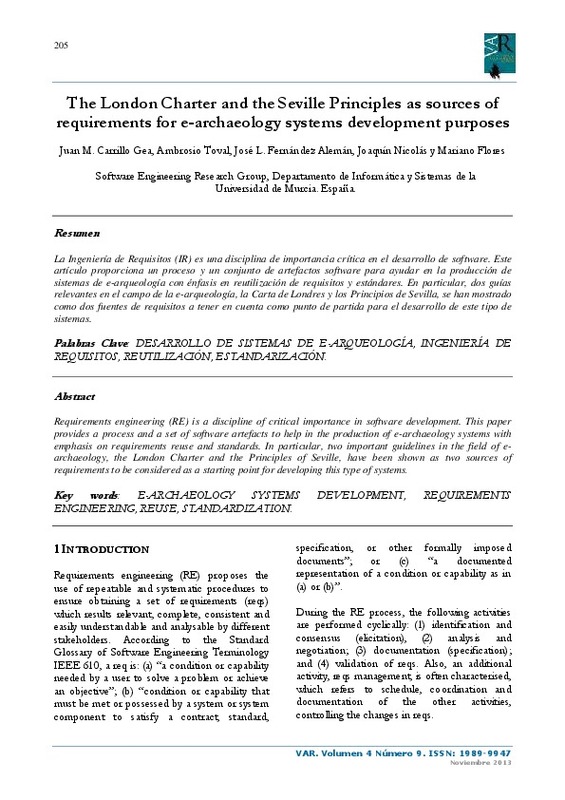JavaScript is disabled for your browser. Some features of this site may not work without it.
Buscar en RiuNet
Listar
Mi cuenta
Estadísticas
Ayuda RiuNet
Admin. UPV
The London Charter and the Seville Principles as sources of requirements for e-archaeology systems development purposes
Mostrar el registro sencillo del ítem
Ficheros en el ítem
| dc.contributor.author | Carrillo Gea, Juan M.
|
es_ES |
| dc.contributor.author | Toval, Ambrosio
|
es_ES |
| dc.contributor.author | Fernández Alemán, José L.
|
es_ES |
| dc.contributor.author | Nicolás, Joaquín
|
es_ES |
| dc.contributor.author | Flores, Mariano
|
es_ES |
| dc.date.accessioned | 2020-03-11T10:15:32Z | |
| dc.date.available | 2020-03-11T10:15:32Z | |
| dc.date.issued | 2013-11-05 | |
| dc.identifier.uri | http://hdl.handle.net/10251/138709 | |
| dc.description.abstract | [EN] Requirements engineering (RE) is a discipline of critical importance in software development. This paper provides a process and a set of software artefacts to help in the production of e-archaeology systems with emphasis on requirements reuse and standards. In particular, two important guidelines in the field of earchaeology, the London Charter and the Principles of Seville, have been shown as two sources of requirements to be considered as a starting point for developing this type of systems. | es_ES |
| dc.description.abstract | [ES] La Ingeniería de Requisitos (IR) es una disciplina de importancia crítica en el desarrollo de software. Este artículo proporciona un proceso y un conjunto de artefactos software para ayudar en la producción de sistemas de e-arqueología con énfasis en reutilización de requisitos y estándares. En particular, dos guías relevantes en el campo de la e-arqueología, la Carta de Londres y los Principios de Sevilla, se han mostrado como dos fuentes de requisitos a tener en cuenta como punto de partida para el desarrollo de este tipo de sistemas. | es_ES |
| dc.description.sponsorship | This research is part of the project PEGASO-PANGEA (TIN2009-13718-C02-02), financed by the Spanish Ministry of Science and Innovation (Spain). | es_ES |
| dc.language | Inglés | es_ES |
| dc.publisher | Universitat Politècnica de València | es_ES |
| dc.relation.ispartof | Virtual Archaeology Review | es_ES |
| dc.rights | Reconocimiento - No comercial - Sin obra derivada (by-nc-nd) | es_ES |
| dc.subject | E-archaeology systems development | es_ES |
| dc.subject | Requirements engineering | es_ES |
| dc.subject | Reuse | es_ES |
| dc.subject | Standarization | es_ES |
| dc.subject | Desarrollo de sistemas de e-arqueología | es_ES |
| dc.subject | Ingeniería de requisitos | es_ES |
| dc.subject | Reutilización | es_ES |
| dc.subject | Estandarización | es_ES |
| dc.title | The London Charter and the Seville Principles as sources of requirements for e-archaeology systems development purposes | es_ES |
| dc.type | Artículo | es_ES |
| dc.identifier.doi | 10.4995/var.2013.4275 | |
| dc.relation.projectID | info:eu-repo/grantAgreement/MICINN//TIN2009-13718-C02-02/ES/Process For Global Requirements Engineering And Quality/ | es_ES |
| dc.rights.accessRights | Abierto | es_ES |
| dc.description.bibliographicCitation | Carrillo Gea, JM.; Toval, A.; Fernández Alemán, JL.; Nicolás, J.; Flores, M. (2013). The London Charter and the Seville Principles as sources of requirements for e-archaeology systems development purposes. Virtual Archaeology Review. 4(9):205-211. https://doi.org/10.4995/var.2013.4275 | es_ES |
| dc.description.accrualMethod | OJS | es_ES |
| dc.relation.publisherversion | https://doi.org/10.4995/var.2013.4275 | es_ES |
| dc.description.upvformatpinicio | 205 | es_ES |
| dc.description.upvformatpfin | 211 | es_ES |
| dc.type.version | info:eu-repo/semantics/publishedVersion | es_ES |
| dc.description.volume | 4 | es_ES |
| dc.description.issue | 9 | es_ES |
| dc.identifier.eissn | 1989-9947 | |
| dc.relation.pasarela | OJS\4275 | es_ES |
| dc.contributor.funder | Ministerio de Ciencia e Innovación | es_ES |
| dc.description.references | CH'NG, E. et al. (2011): "From sites to landscapes: how computing technology is shaping archaeological practice", en Computer, vol. 44, n. 7, pp. 40-46. | es_ES |
| dc.description.references | COS, J.A. et al. (2012): "Internationalization requirements for e-learning audit purposes", en Proceedings of the 3rd IEEE Global Engineering Education Conference, EDUCON 2012, pp. 90-95. http://dx.doi.org/10.1109/educon.2012.6201027 | es_ES |
| dc.description.references | GLASS, R.L. (2002): Software engineering: facts and fallacies. Addison-Wesley. Boston. | es_ES |
| dc.description.references | GREENFIELD, J. and SHORT, K. (2004): Software factories: assembling applications with patterns, models, frameworks, and tools. Wiley. Indianapolis. | es_ES |
| dc.description.references | KÄKÖLÄ, T. and DUEÑAS, J.C. (Eds.) (2006): Software Product Lines. Research issues in engineering and management. Springer. Berlin Heidelberg. http://dx.doi.org/10.1007/978-3-540-33253-4 | es_ES |
| dc.description.references | TOVAL, A. et al. (2002): "Requirements reuse for improving information systems security: a practitioner's approach", en REJ Requirements Engineering Journal, vol. 6, n. 4, pp. 205-219. | es_ES |
| dc.description.references | TOVAL, A. et al. (2008): "Eight key issues for an effective reuse-based requirements process", en IJCSSE International Journal of Computer Systems Science and Engineering, vol. 23, n. 6, pp. 373-385. | es_ES |
| dc.description.references | TOVAL, A. et al. (2011): "Learning systems development using reusable standard-based requirements catalogs", en Proceedings of the 2nd IEEE Global Engineering Education Conference, EDUCON 2011, pp. 907- 912. http://dx.doi.org/10.1109/educon.2011.5773253 | es_ES |








